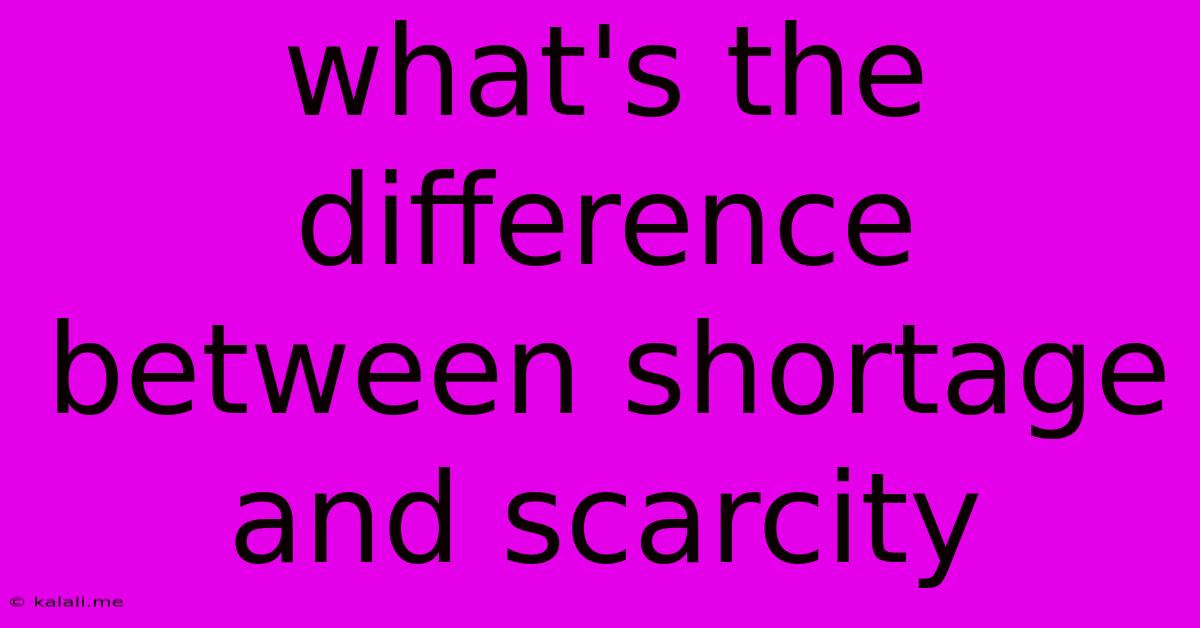What's The Difference Between Shortage And Scarcity
Kalali
Jun 14, 2025 · 3 min read

Table of Contents
Shortage vs. Scarcity: Understanding the Key Differences
Understanding the difference between shortage and scarcity is crucial for grasping fundamental economic concepts. While both terms relate to limited availability, they differ significantly in their causes and implications. This article will delve into the nuances of each concept, clarifying their definitions and highlighting the key distinctions. This will help you understand resource allocation, market dynamics, and the impact of economic forces on supply and demand.
What is Scarcity?
Scarcity, in economics, refers to the fundamental economic problem of limited goods and services to meet seemingly unlimited human wants and needs. It's an inherent condition of all societies, regardless of their level of economic development. Scarcity isn't about temporary unavailability; it's a permanent state. Think about it: there's only so much land, oil, and clean water on Earth. These resources, even if abundant now, are finite.
This inherent limitation forces choices. Because resources are scarce, societies must decide how to allocate them efficiently. This involves considering opportunity costs – the value of the next best alternative forgone. For example, using land for a park means losing the opportunity to build houses on it. Scarcity is the driving force behind economic decisions at all levels, from individual consumers to governments.
Key Characteristics of Scarcity:
- Permanent: Scarcity is a continuous condition, not a temporary one.
- Relative: The scarcity of a good or service is relative to its demand. Something might be scarce in one context but plentiful in another.
- Fundamental: Scarcity is the basis of economics, driving decision-making and resource allocation.
What is a Shortage?
A shortage, unlike scarcity, is a temporary condition where the quantity demanded of a good or service exceeds the quantity supplied at a given price. It's a market imbalance, often caused by external factors. A shortage isn't inherent to the good itself; it's a specific situation at a particular point in time.
For instance, a sudden surge in demand for a specific product (e.g., due to a natural disaster) might outstrip the supply, leading to a temporary shortage. Similarly, supply chain disruptions, production issues, or government price controls can also cause shortages. Importantly, shortages can usually be addressed by increasing supply or decreasing demand (through price adjustments, for example).
Key Characteristics of a Shortage:
- Temporary: Shortages are usually short-lived and can be resolved.
- Market-Specific: Shortages occur in specific markets for specific goods or services.
- Price-Related: Shortages often arise when prices are artificially low (price controls) or when supply can't keep up with increased demand.
The Crucial Difference:
The key distinction lies in permanence. Scarcity is a permanent condition of limited resources; a shortage is a temporary imbalance between supply and demand. Scarcity is an inherent characteristic of the good itself, while a shortage is a condition of the market. Scarcity forces economic choices, while shortages lead to market adjustments like price increases or rationing.
In Summary:
While both scarcity and shortages imply limited availability, scarcity is a fundamental economic problem relating to the inherent limitations of resources, while a shortage is a temporary market condition driven by imbalances between supply and demand. Understanding this difference is essential for analyzing economic phenomena and making informed decisions.
Latest Posts
Latest Posts
-
First 18 Elements On The Periodic Table
Jun 14, 2025
-
Lcm Of 10 8 And 4
Jun 14, 2025
-
Google Yahoo And Bing Are Examples Of What
Jun 14, 2025
-
How To Write 1150 On A Check
Jun 14, 2025
-
Difference Between Operations Manager And Production Manager
Jun 14, 2025
Related Post
Thank you for visiting our website which covers about What's The Difference Between Shortage And Scarcity . We hope the information provided has been useful to you. Feel free to contact us if you have any questions or need further assistance. See you next time and don't miss to bookmark.